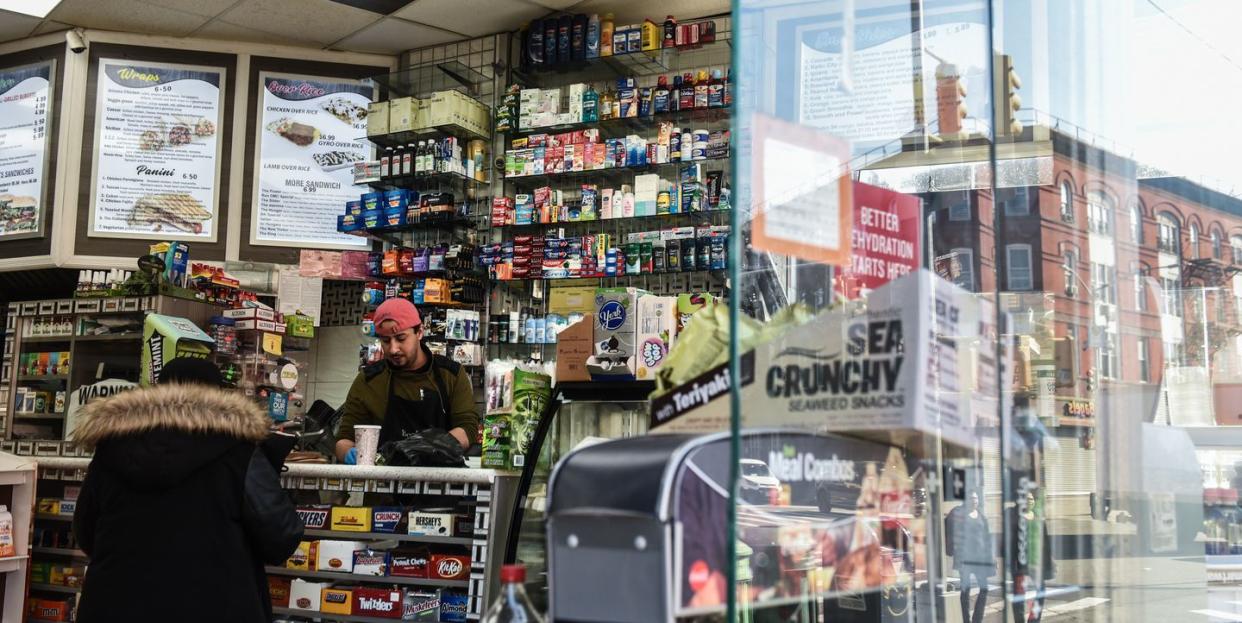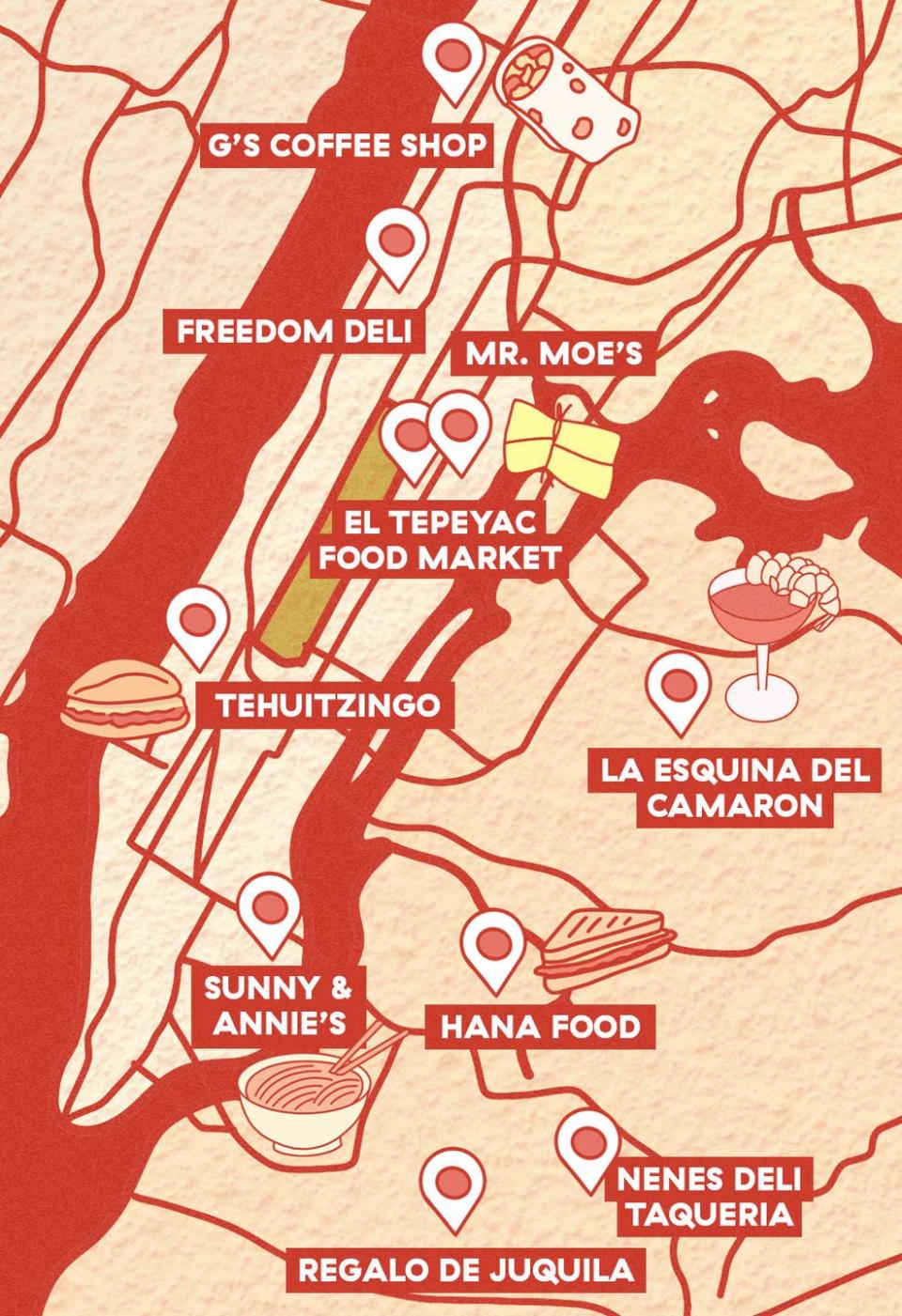What You Don't Know About The Deep-Rooted Latinx Influence Behind Thousands Of NYC Bodegas

Among the flashing lights, Broadway shows, bottomless brunches, and sky-high buildings there’s a less celebrated staple to New York City life: the bodega.
You may not know them by this name, but instead refer to them as corner stores, delis, or grocers. The definition of a bodega is rather fluid, a term coined years ago that has shifted with time just as the city has. According to the New York City government, a bodega is a store with no more than two cash registers and sells mostly food (but doesn’t specialize in one item) and milk. Colloquially, a bodega might just be "one of those stores with a cat inside." No matter your definition, people know what they are because they sprinkle every block of NYC.
Still, it's difficult to pin down how many bodegas there are across the five boroughs, especially because not all of them self-identify as one. Some might have a faded awning reading “Deli”; others might have a neon sign buzzing with “Grocery,” and so on. Reports like this one by Grub Street have estimated the number to be around 8,000, although it’s hard to say when the criteria is so conflicting.
There is a deep-rooted Latinx influence at the birth of the businesses you can see every few steps around New York whether they are plastered with the word "bodega" or not. To comprehend the influence these storefronts—offering everything from ATMs to sour candies to one single roll of toilet paper to a lightbulb at all odd hours of the day—we have to look back to the 1920s.
A book by Carlos Sinabria called The Bodega: A Cornerstone of Puerto Rican Barrios explains how the original bodegas were entrepreneurial ventures by the first influx of Puerto Ricans to come to the mainland in the 20th century. Many left the island of Puerto Rico for the island of Manhattan and other boroughs following World War II and bodegas started popping up as these Latinx communities did.
"Puerto Ricans were granted U.S. citizenship with the passage of the Jones Act in 1917, which allowed for more access to U.S. jobs, social and political opportunities, including establishing these bodegas to connect them with the Island," says Carlos Figueroa, who has Ph. D in Political Science and Historical Studies and teaches at Ithaca College. "Bodegas proliferated after WWII as first-generation Puerto Rican-owned businesses established by migrants (sometimes war vets) seeking better economic and social opportunities on the mainland."
As the Puerto Rican community grew, so did the demand for places selling the ingredients used in cultural cuisines, thus birthing the bodega, which conflicts with the official New York City government-sanctioned definition that excludes specialized groceries.
Those specialized groceries are a pillar of life, especially for BIPOC-indentifying people, including the Latinx community. Figueroa noted using the term "Latinx" can eliminate the necessary nuance of different disparate populations. Under that term there are Puerto Ricans, Dominicans, Mexicans, Cubans, and more, each group using different ingredients to achieve their most popular meals, thus needing stores that carry those items. The demand for bodegas and their offerings is no surprise considering how enmeshed food is with culture.
“Genetically, we are prone to accepting certain tastes as we have evolved as offspring of our ancestors," says Dr. Amy Lee, Head of Nutrition for Nucific. "For good or for bad, it [food] is ingrained, and dictates our behavior.” Behaviors like going out of one’s way to find the same brand seasoning used in your grandmother’s rice or the particular ripeness of plantains to make the perfect tostones, these nostalgia-ridden foods that can sometimes only be found in small scale bodegas which is what makes them such a beloved part of big city living.
While mainstream grocery chains may have specific aisles dedicated to cultural foods, oftentimes these sections are small and may include Americanized versions of those ingredients. It’s this gap that bodegas, grocers, and corner store delis can fulfill, particularly in New York City, which consistently ranks in the top five most culturally diverse cities in the world with Queens known as the most diverse borough.
It's not only the specialty groceries and rare food items that keep customers loyal to their neighborhood bodegas, it's the camaraderie that exists inside these small businesses. "Bodegas were and at times still are the center of a neighborhood. Literally, these often serve as a commonplace, its own public square, where people go to get information about apartments, jobs, parties, and furniture," says Figueroa.
This is why New Yorkers, both natives and transplants feel a deep connection to "their" corner stores. The place they can drop off their keys for a friend to go pick up, the last stop before going home after a night out to pick up a hot sub they'll likely finish the next morning, a dependable place to get a lottery ticket when they're feeling lucky. Behind all of that, there were people who missed home, their islands, and wanted to make comfort food from scratch all while trying their hand at entrepreneurship on the mainland that offered so much promise.
Regardless of the historical context of bodegas in big cities like New York and other areas touched by Puerto Rican migrants in the '20s like New Jersey, Pennsylvania, and Connecticut, the corner store has been a place for people of all walks of life to find ingredients familiar to them or to pick up the most basic household necessities after hopping up a train. As I write this, I can think of at least five bodegas I could get to in less than 35 strides. And I know for a fact at least one of them carries the same beans my mom uses in her Christmas eve arroz con gandules.
Now more than ever, it's important to shop local as we continue to navigate the ongoing pandemic and its effect on small businesses. Below are some local NYC bodega and deli recommendations, both Latinx-owned and otherwise, from team Delish to enjoy authentic Latin food, hot sandwiches, and more.

Sunny & Annie’s - 94 Ave B New York, NY 10003
Freedom Deli - 908 St Nicholas Ave, New York, NY 10032
G’s Coffee Shop - 634 W 207th St, New York, NY 10034
Hana Food - 534 Metropolitan Ave, Brooklyn, NY 11211
La Esquina Del Camaron Mexicano - 80-02 Roosevelt Ave, Queens, NY 11372
Mr. Moe’s - 2001 3rd Avenue 1924 2nd Ave New York, NY 10029
Nenes Deli Taqueria - 14 Starr St, Brooklyn, NY 11237
Regalo De Juquila - 1209 Myrtle Ave Brooklyn, NY 11221
Tehuitzingo - 695 10th Ave, New York, NY 10036
You Might Also Like

